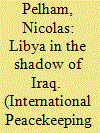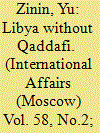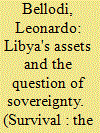|
|
|
Sort Order |
|
|
|
Items / Page
|
|
|
|
|
|
|
| Srl | Item |
| 1 |
ID:
115327


|
|
|
|
|
| Publication |
2012.
|
| Summary/Abstract |
In formulating its plans for government, the National Transitional Council (NTC), the political arm of the anti-Qaddafi uprising in 2011, was heavily guided by international thinking regarding the experience of de-Ba'athification in Iraq. In attempting to avoid 'reliving the Iraq war', the NTC, made a conscious decision to integrate the 'Old Guard' into the new order, but thereby created new challenges by alienating those who had led the rebellion. This Eyewitness is based on insights - from the author's interviews in Libya (particularly at the Second Congress of the rebel militias of April 2012), and argues that the fledgling central authority added to post-Qaddafi instability by failing to secure the buy-in of the rebel militias into their post-conflict vision of a civilian order, replete with elections. It concludes that in their zeal to correct the mistakes the West made in Iraq, Libya's new authorities may well have over compensated creating fresh obstacles to the country's stabilization and reconstruction.
|
|
|
|
|
|
|
|
|
|
|
|
|
|
|
|
| 2 |
ID:
112814


|
|
|
|
|
| Publication |
2012.
|
| Summary/Abstract |
IN LIBYA, the supreme power in October 2011 passed into the hands of the National Transitional Council (NTC), which declared the country's liberation from Muammar Qaddafi's dictatorship.
With his removal the authoritarian model he called Jamahiriya ("state of the masses") lost its top leadership. The social and political system, crafted specifically for the leader, had ensured the governability and development of a vast country with a small population and riven by tribal loyalties as a single state for 42 years.
In autumn 2011, the NTC published a Roadmap for Democracy in Libya with a 20-month countdown to an election for a Constituent Assembly to adopt a new Constitution and other laws. After the Assembly's election, NTC is to be dissolved.
|
|
|
|
|
|
|
|
|
|
|
|
|
|
|
|
| 3 |
ID:
114965


|
|
|
|
|
| Publication |
2012.
|
| Summary/Abstract |
In mid-February 2011, after popular revolts had overturned governments in Tunisia and Egypt, the so-called 'Arab Spring' reached the coasts of Libya. Protests against the decades-long rule of Colonel Muammar Gadhafi broke out in several Libyan cities and quickly gathered momentum, despite the efforts of the country's security forces to contain them. On 27 February, the leadership of the anti-Gadhafi movement, based in the eastern Libyan city of Benghazi, formed an interim National Transitional Council (NTC), which immediately declared itself the sole representative of the Libyan people. But although the uprisings in Tunisia and Egypt were quick and relatively bloodless, in Libya, the confrontation between Gadhafi's regime and the insurgents rapidly turned into an armed conflict.
|
|
|
|
|
|
|
|
|
|
|
|
|
|
|
|
| 4 |
ID:
133626


|
|
|
|
|
| Publication |
2014.
|
| Summary/Abstract |
Even though demonstrations in Tunisia led to the resignation of President Ben Ali on January 14, 2011, no Western analyst would have believed that the "days of anger" summoned in Libya on February 17 would also result in a change of political power. The ruling tribal alliance that had been in place since Muammar al-Qadhafi's rise to power in September 1969 was so well-entrenched that an ouster by mass protest seemed impossible. It consisted of Qadadfa, Warfalla and Maqarha as well as loyal security forces, primarily the Revolutionary Committees under the command of Qadhafi and the military special brigades,1 mainly recruited from members of the Qadadfa tribe. Yet, ousted it was in the wake of an eight-month civil war caused by the bloody actions of the security forces against demonstrators, in particular in Benghazi after February 17. The protest was grounded in the deep discontent of the majority of the population with political paternalism, lack of liberty, severe human-rights violations, and the absence of economic and social development.
|
|
|
|
|
|
|
|
|
|
|
|
|
|
|
|
|
|
|
|
|